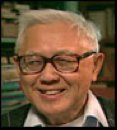 Him Mark Lai – 麥禮謙 (1925-2009), noted Chinese-American genealogist and local historian has passed away.
Him Mark Lai – 麥禮謙 (1925-2009), noted Chinese-American genealogist and local historian has passed away.
Edition: 5 star Page: B5(c) San Francisco Chronicle 2009. Reprinted here with permission.
by Carl Nolte.
Him Mark Lai, a noted historian of the Chinese American experience, died at his San Francisco home on May 21 after suffering from cancer and its complications. He was 84.
Mr. Lai was an expert on the history of Chinese and Chinese Americans from the time of the first Asian settlement in California just before the Gold Rush to the present day. He wrote and edited 10 books and more than 100 scholarly articles on Chinese American life – a field that was mostly ignored by non-Asian historians.
L. Ling-chi Wang, professor of Asian American studies at UC Berkeley, called Mr. Lai “the dean of Chinese American history.”
“Him Mark Lai’s contribution to Chinese American history is immeasurable” said Philip Choy, an eminent historian. “He was a pioneer who legitimized Chinese American studies, whose influence will carry on for many more generations.”
Mr. Lai led a complex life, reflecting the racial, legal and political currents of his time. He was both a trained mechanical engineer and self-taught scholar. He was a quiet and unassuming man, but his demeanor masked a fierce devotion to civil rights and to telling the often ignored story of how Chinese Americans fought discriminatory laws to become successful in a new country.
Mr. Lai was born in San Francisco’s Chinatown in 1925, the first of his family to be born in this country. His father, Maak Bing, was born in China, but because of the Chinese Exclusion Act, could not legally immigrate to the United States. So he took the name of Lai, claiming to be the son of an American citizen.
These “paper sons” who had adopted false names, were among thousands of Chinese admitted to the United States until the Exclusion Acts were repealed in 1943.
His father, however, gave each of his five children the middle name of “Mark,” an Anglicized version of his own name, to remind them of their family heritage.
Mr. Lai attended Commodore Stockton elementary school and the Nam Kue Chinese School simultaneously, so that he had an education in both American and Chinese cultures.
While at San Francisco’s Galileo High School, Mr. Lai won a citywide essay contest in history; and he decided to go to college. However, his father discouraged that idea on grounds that racism would prevent him from being promoted. Instead, he urged his son to get a blue-collar job in the shipyards.
“San Francisco wasn’t always so liberal,” Mr. Lai said years later.
Instead, Mr. Lai worked his way through City College of San Francisco and graduated from UC Berkeley in 1947 with a degree in mechanical engineering. He then went to work for Bechtel Corp. as an engineer.
He also became interested in the civil war then raging in mainland China between the Nationalists and the Communist forces. His early support for the Communist-backed People’s Republic drew the attention of the FBI and political pressure common in the McCarthy era. His position was complicated by the fact that his father was a “paper son.”
“You had to be very careful,” he would later recall. “You did not want to bring problems on your family.”
However, Mr. Lai’s work in Chinese causes helped give him a new fluency in spoken and written Chinese, and he met Laura Jung, a new immigrant from China. They married in 1953.
In 1960, he took a course at UC Extension about Asian American history, and he realized that whole areas of Chinese American history had never been properly studied.
He began extensive research into what he called an “ignored past” and did careful landmark studies on the Chinese-language press in the United States and all aspects of Chinese American life.
He produced several volumes of monographs called “Chinese America: History & Perspectives.” His most important book is “Becoming Chinese Americans: a History of Communities and Institutions.”
His work is considered seminal in the studies of Asian American history.
He also taught at San Francisco State University and UC Berkeley. “Prior to 1969, when we taught our first class at San Francisco State University, ethnic studies did not exist,” Choy said.
“It was through Him Mark’s scholarship, research and collections that these courses now exist at major academic institutions in the country.”
Mr. Lai is survived by his wife of 55 years, Laura Lai of San Francisco.
A memorial service will be held at the Chinese Cultural Center, 750 Kearny St., San Francisco, at 2:30 p.m. on June 20.
.
